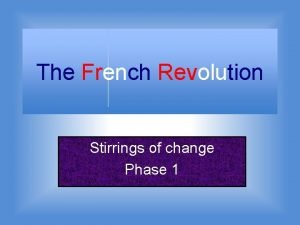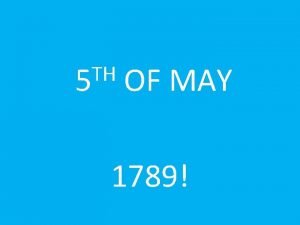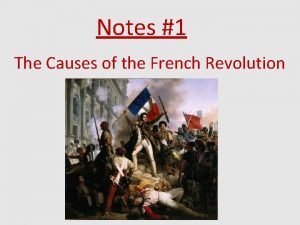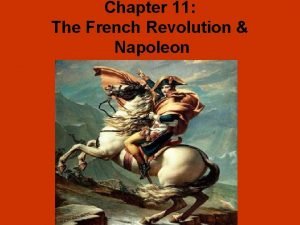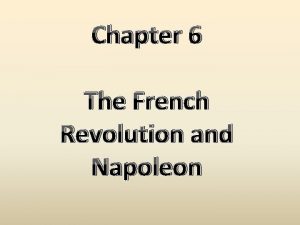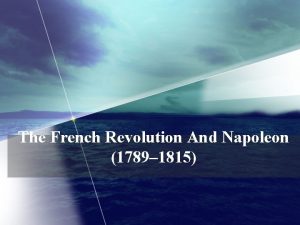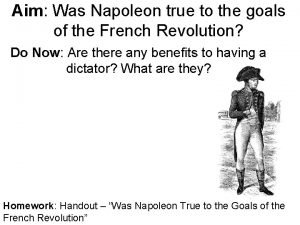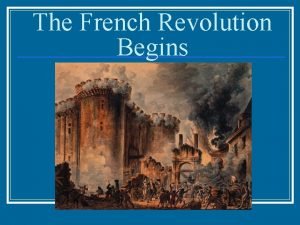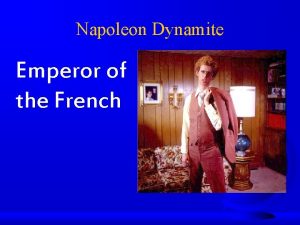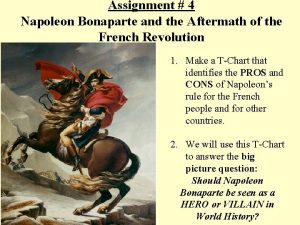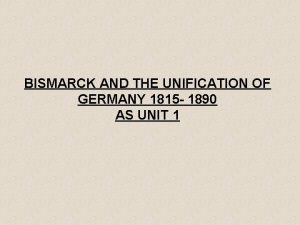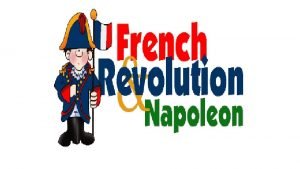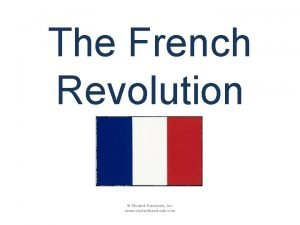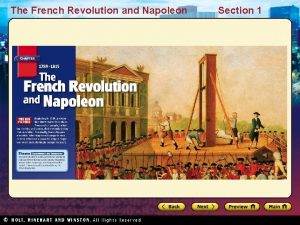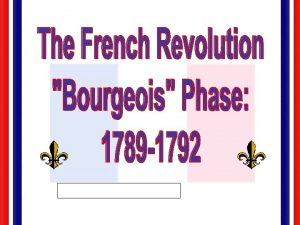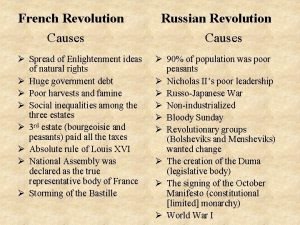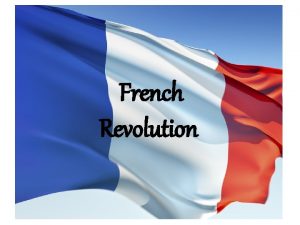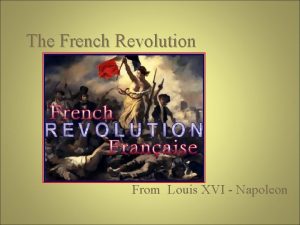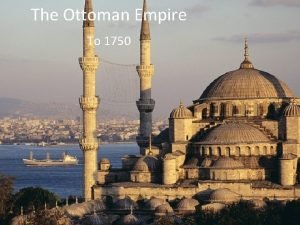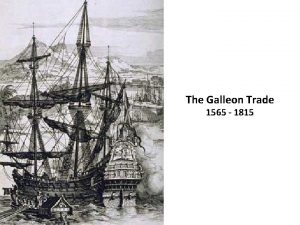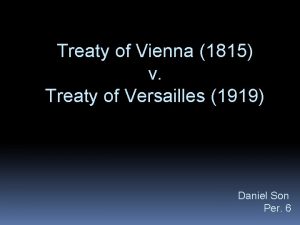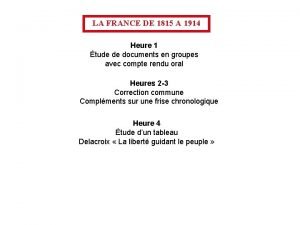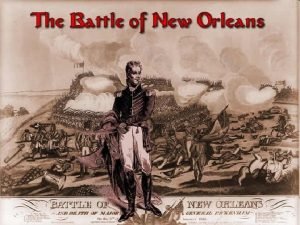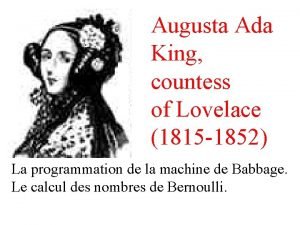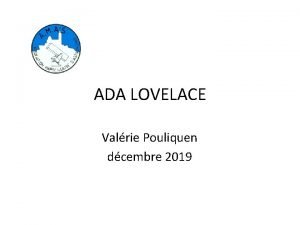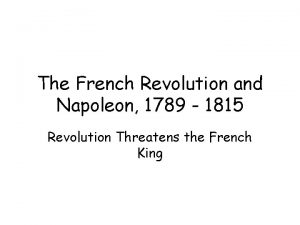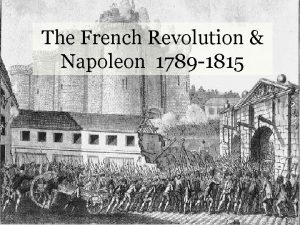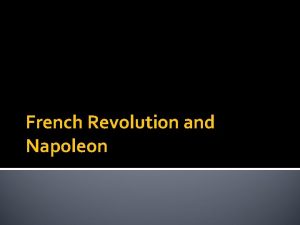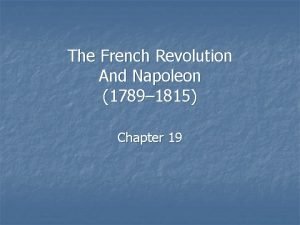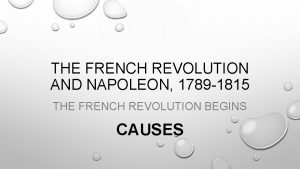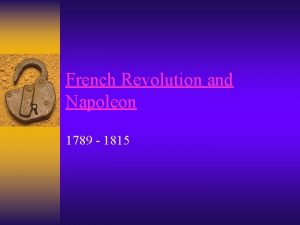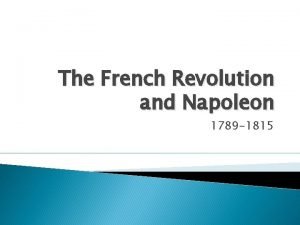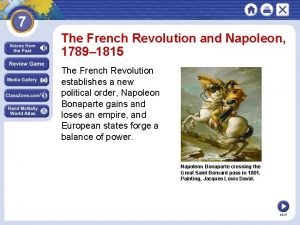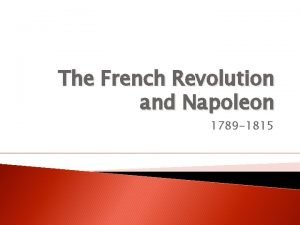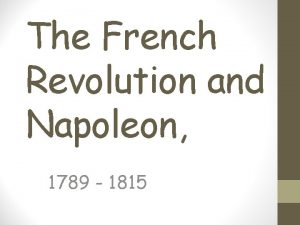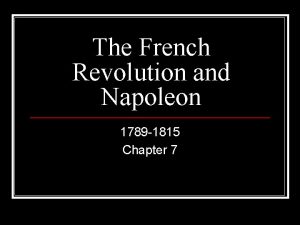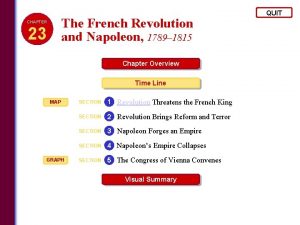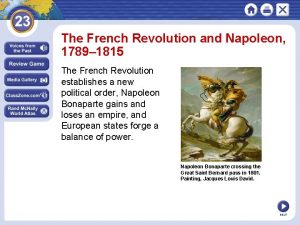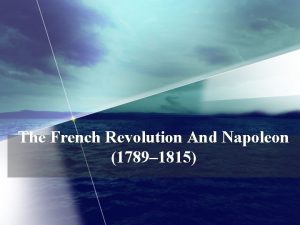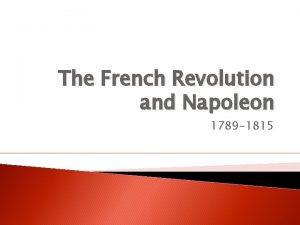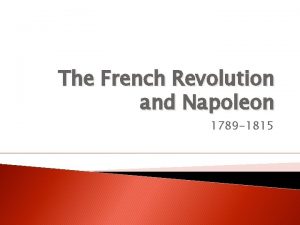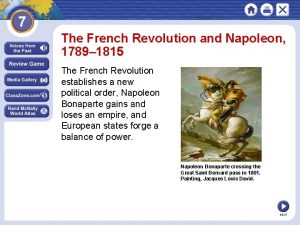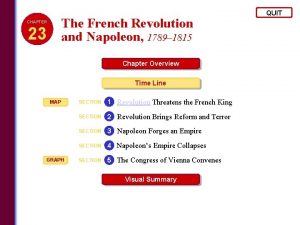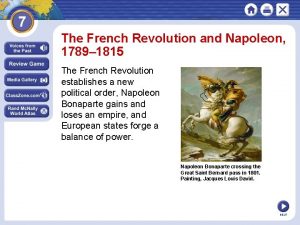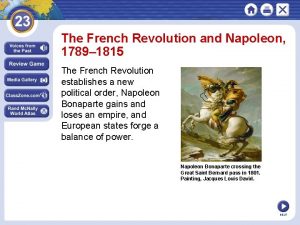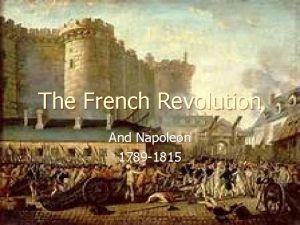The French Revolution and Napoleon 1789 1815 On


































- Slides: 34

The French Revolution and Napoleon (1789 -1815) On the Eve of the Revolution WEX II Chapter 2, Section 1

On the Eve of the Revolution At the end of this section, I will be able to answer the following questions: § What was the social structure of the old regime? § Why did France face an economic crisis by 1789? § Why did efforts at reform fail? § Vocabulary bourgeoisies, deficit, spending

On the Eve of the Revolution What was the Old Regime? § The old order consisted of 3 Social Classes: – 1 st Estate – Clergy – 2 nd Estate – Nobility – 3 rd Estate – Majority

On the Eve of the Revolution The Church made up the First Estate § The Church had great influence at this time. – Owned 10% of the Land – Collected tithes – Didn’t pay any taxes § High Church Leaders lived well – Bishops & Abbots lived as nobles – However, the Parish priest lived poorly

On the Eve of the Revolution The titled Nobility made up the Second Estate § The King gave them the top jobs in – government – the army – the courts and in – the Church

On the Eve of the Revolution However, some nobles lived away from the center of power § Owned land, but had small incomes § Felt pinched to maintain status while prices were rising § Resented the middle class for getting jobs that had been reserved for the aristocracy § Feared loosing traditional privileges – Especially freedom from paying taxes

On the Eve of the Revolution The Third Estate included the remaining 98% of the population (27 million people) § Bourgeoisie's were at the top – middle class (about 8% of the population) – They were prosperous bankers, merchants, manufacturers – Officials who worked for royalty § Lawyers, doctors, journalists, professors, skilled artisans

On the Eve of the Revolution Who made up the majority of the Third Estate? § 90% of the people were rural peasants – Some of them were landowners who hired farmers to work for them – Some were tenant farmers or day laborers who owed obligations to the local nobles

On the Eve of the Revolution However, the poorest member of the Third Estate were city workers – This included apprentices, journeymen, and others who worked in industry – Many people worked as servants, stable hands, porters, construction workers, or street hawkers. – Many were unemployed and either begged or stole to survive.

On the Eve of the Revolution Why were so many people dissatisfied with this social system? § Everyone in the 3 rd Estate resented the privileges enjoyed by their “social better” § Wealthy bourgeois families could buy political office and even titles. § However, the best jobs were still reserved for nobles.

On the Eve of the Revolution § The urban workers were paid such low wages that even the smallest price increase in bread could result in starvation § Peasants were heavily taxed for everything § Peasants owed fees and services dating back many years. § When money got tight, nobles wanted the peasants to pay these old manor dues

On the Eve of the Revolution § Only nobles had the right to hunt game. § Peasants were forbidden to kill rabbits that were eating their crops § (Remember that the nobles could trample the peasants fields while they were hunting and the nobles weren’t responsible for what this cost the peasants)

On the Eve of the Revolution Enlightenment ideas are reading the cities and towns. § People asked, “why should the first two estates have privileges at the expense of the majority? ” § It’s didn’t pass the test of reason! – The 3 rd Estate started demanding that the privileged classes start paying their share.

On the Eve of the Revolution The chart showing Population & Land Ownership tells a revealing tale (page 65) § 1 st Estate: ½% of the people owned 10% of the land § 2 nd Estate: 1. 5% of the people owned 20% of the land § 3 rd Estate: 98% of the people owned only 70% of the land

On the Eve of the Revolution Additionally, there is a financial crisis! § The government had been spending more money that it was taking in § This is called deficit spending

On the Eve of the Revolution Why was France in debt? § Cost of War: – 7 Years’ War – Supporting America’s revolutionary war § Prices had been increasing everywhere § Lavish life styles of the court cost the government millions of dollars – Loans were purchased to make up this gap, so ½ of tax revenue went to paying debt

On the Eve of the Revolution How could this financial crisis get any worse? § Crumbling economy – General Economic decline in the 1770 s – 1780, bad harvests sent food prices soaring – Brought hunger to poorer peasants & city dwellers

How did the people respond? § In towns, people rioted & demanded bread § In the countryside, people started attacking manors to get food

On the Eve of the Revolution What is the King going to do? § Louis XIV who ruled from 1715 -1774 – pursued pleasure before business § Louis IV took over in 1774 – He tried to address these problems § He looked to Jacques Necker, a financial wizard to help solve these financial woes

On the Eve of the Revolution Jacques Necker has a financial plan § Reduce Court spending § Reform government § Improve internal trade by abolishing the tariffs that made trade costly § Start taxing the 1 st and 2 nd Estates

On the Eve of the Revolution Did everyone embrace these solutions? § No, the nobles and the high clergy got King Henry XV to dismiss Necker for proposing that they pay taxes. § What are they going to do now?

On the Eve of the Revolution The wealthy and powerful classes demanded that the king call the Estates General – The Estates General hadn’t been called in 175 years – They hoped that through the Estates General that they would be able to establish a constitution § Limit the kings power § Protect the privileges for the nobles § (what’s an Estates General anyway? )

On the Eve of the Revolution How did Louis XVI prepare for the Estates General meeting at Versailles in May of 1789? § He had all 3 Estates prepare cahiers – cahiers are notebooks listing their grievances § How did this help Louis XVI prepare?

On the Eve of the Revolution What things did the cahiers call for? § Fairer taxes § Freedom of the press § Regular meetings of the Estates General § Right to kill animals that destroy crops § Some servant girls wanted to some reward for years of servicing their masters

On the Eve of the Revolution § Some people referred to the tax collectors as “bloodsuckers”? § Some called the courts of nobles as “vampires pumping the last drop of blood” from people” § Another complained that “ 20 million must live on half the wealth of France while the clergy …devour the other half. ”

On the Eve of the Revolution How did the Estates General go? § Delegates from the 3 rd Estate wanted to meet as a group. – They usually meet separately; the 1 st and 2 nd Estates could out vote the 3 rd Estate – Remember, the 3 rd Estate represented 98% of the people – The representatives of the 3 rd Estate knew about the Enlightenment thinkers and wanted to implement these ideas

On the Eve of the Revolution What did the 3 rd Estate do after several weeks of being deadlocked? § They proclaimed that they represented the people of France § They called themselves the National Assembly § They invited the other Estates to help them form a constitution

On the Eve of the Revolution How did the King react to the National Assembly? § He locked them out of the meeting place § The national Assembly took the Tennis Court Oath and vowed not to leave until a constitution was draw up

On the Eve of the Revolution § The King had to recognize the National Assembly – Some clergy & nobles joined the National Assembly – However, royal troops gathered around Versailles & Paris – It was rumored that the King would dissolve the National Assembly

On the Eve of the Revolution What was Storming the Bastille? § On July 14, 1789, more than 800 Parisians demanded – that the prisoners be released – That they be given weapons & the gunpowder believed to be stored there. § The commander of the Bastille refused & fired on the crowd

On the Eve of the Revolution How did the crowd react? § They stormed the Bastille and eventually overpowered the soldiers – killed the 5 guards – Released the prisoners – However, they didn’t find any guns or ammunition § This day is known as “Bastille Day” – It’s a national holiday in France

On the Eve of the Revolution § § § The French Revolution-1: The French Revolution-2: The French Revolution-3: § The French Revolution-4: § The French Revolution-5: http: //www. youtube. com/watch? v=2 v. Zchj 7 art 0 http: //www. youtube. com/watch? v=43 Bj. Kl_Tr. Cw ttp: //www. youtube. com/watch? v=cy. Cdazyz 2 is&feature=relmfu

On the Eve of the Revolution § French Revolution Kahn academny

On the Eve of the Revolution
 October 6 1789 french revolution
October 6 1789 french revolution What was an immediate cause of the 1789 french revolution
What was an immediate cause of the 1789 french revolution 05.05.1789
05.05.1789 Three estates
Three estates Chapter 11 the french revolution and napoleon
Chapter 11 the french revolution and napoleon Chapter 23 the french revolution and napoleon
Chapter 23 the french revolution and napoleon The french revolution and napoleon section 1 quiz
The french revolution and napoleon section 1 quiz Chapter 11 the french revolution and napoleon
Chapter 11 the french revolution and napoleon Napoleon 1789
Napoleon 1789 Napoleon's goals
Napoleon's goals Russian revolution vs french revolution
Russian revolution vs french revolution You should hope this game will be over soon
You should hope this game will be over soon The political and social system in france cartoon
The political and social system in france cartoon Emperor napoleon
Emperor napoleon Where did napoleon rule
Where did napoleon rule Liberalism and nationalism in germany 1815-71
Liberalism and nationalism in germany 1815-71 Causes and effects of french revolution
Causes and effects of french revolution Causes and effects of the french revolution
Causes and effects of the french revolution Causes and effects of french revolution
Causes and effects of french revolution French revolution causes and effects
French revolution causes and effects French revolution causes and effects
French revolution causes and effects Enlightenment principles
Enlightenment principles French revolution
French revolution Jack and jill french revolution
Jack and jill french revolution Ottoman empire in 1750
Ottoman empire in 1750 Galleon trade meaning
Galleon trade meaning Europa sfintei aliante
Europa sfintei aliante Treaty of vienna 1815
Treaty of vienna 1815 1799-1815
1799-1815 Frise chronologique 1815 à 1870
Frise chronologique 1815 à 1870 Frise chronologique 1815 à 1914
Frise chronologique 1815 à 1914 1914 took a little trip
1914 took a little trip 1815
1815 Lovelace 1815
Lovelace 1815 Lovelace 1815
Lovelace 1815
